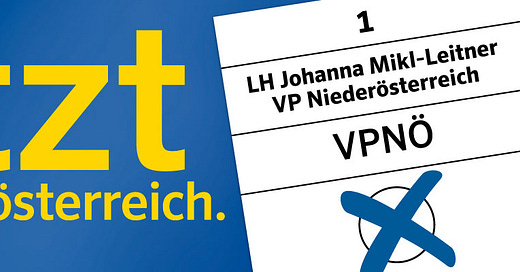Hanni's Waterloo?
State elections in Lower Austria on Sunday will indicate the endurance of the conservative People's Party and far-right's growing popularity
Servus!
All eyes are on the state of Lower Austria, where voters will go to the polls on Sunday to elect a new state parliament. Lower Austria is the largest state in Austria in terms of geographical area, second-largest by population, and third-largest in terms of GDP due to its proximity to Vienna and developed industrial and agricultural sectors. It is also a fiefdom of the conservative People’s Party (ÖVP), which has controlled the governorship of the state since the end of the Second World War.
In 2017, after 25 years in office, Erwin Pröll handed the governorship of Lower Austria over to his chosen successor, Johanna Mikl-Leitner, whose last major role was as interior minister in the federal government from 2011 to 2016. The initial transition was deemed a success after Mikl-Leitner successfully defended the ÖVP’s absolute majority in the state parliament in elections held in January 2018, winning 49.63 percent of the vote. Using Lower Austria as a power base, Mikl-Leitner has been able to play an outsized role in federal politics and the ÖVP’s internal affairs. That Karl Nehammer is Austria’s chancellor is in no small part her doing.
This Sunday, Mikl-Leitner is faced with defending the ÖVP’s 20-years-old majority—and the governor has a mountain to climb. The political conditions at the federal level—inflation, migration, and the ÖVP’s rolling corruption scandals—are against her, and it is hard to pinpoint any concrete achievements or prestige projects from her first full term in the governor’s seat. The most recent Market survey for the Standard showed that the ÖVP’s vote share looks set to fall 10 points to 39 percent. The main beneficiary would be the far-right Freedom Party (FPÖ), which is projected to make a 10-point gain on its vote share from 2018.


Lower Austria is one of only two states in Austria that still holds to the old Proporz system, by which cabinet posts in state government are divided up among political parties according to their representation in the state parliament.1 Were the ÖVP to lose its absolute majority, the result would be two-fold. First, the ÖVP would no longer be able to dictate government policy in the state without parliamentary support from either the FPÖ or the Social Democratic Party (SPÖ). Second, additional cabinet seats would have to be handed over to another party, likely the FPÖ.
After Sunday, Mikl-Leitner will continue to govern the state. The ÖVP will remain the largest party, and the idea floating around that the SPÖ and FPÖ will somehow gang up in order to install an alternative governor strikes me as a journalistic fantasy. It would suicidal for the SPÖ to install as governor Udo Landbauer, whose politics appear extreme even for the FPÖ. Landbauer was a member of and held leadership positions in the greater German national fraternity Germania zu Wiener Neustadt, which for decades used a songbook that propagated antisemitism, racism, and the glorification of Nazism.
But if the ÖVP’s vote share did fall by 10 points or even five, the party’s complete dominance of Lower Austrian politics would be broken. Part of the blame would fall on Mikl-Leitner’s shoulders. The morning after the night before, attention would also turn to Vienna and the role of the federal ÖVP’s senior leadership including Nehammer in the party’s relative decline. If blocking Bulgarian and Romanian membership of the Schengen common travel area was a gambit to sure up Mikl-Leitner’s standing, it hasn’t worked. Faced with a choice between the ÖVP and FPÖ, polls indicate that right-wing voters in Lower Austria—and nationwide—would rather have the real thing over the imitation.
Bis bald!
Thank you for subscribing to the Vienna Briefing. If you know someone who might also be interested in receiving this newsletter, consider sharing it with them today.
The Vienna Briefing is a free newsletter. If you enjoy and would like to support my work, think about sending me a tip via PayPal. Thank you to all those who have contributed.
How Much?
The federal chancellery spends €450,000 a month on personnel costs for its public relations department. In response to an information request lodged by the SPÖ, the chancellery confirmed it employs 97 people in its PR department as well as seven press spokespersons.
Teichtmeister Charged
The Austrian actor Florian Teichtmeister has been indicted on child pornography charges and fired from the Burgtheater’s ensemble. The theatre waited until now to dismiss Teichtmeister, even though allegations surrounding the actor were reported in the press some months prior.
Café Ritter Bankrupt, Again
Café Ritter Ottakring has gone into insolvency for the second time in three years. The historic coffeehouse on Ottakringer Strasse in Vienna’s sixteenth district opened in 1907; its regulars once included the Austrian national soccer star Ernst Happel.
The other is Upper Austria.




